After visiting Saratoga Performing Arts Center in 2024, Farm Aid heads to the Upper Midwest for a day full of music, farming, education and activism at Huntington Bank Stadium in Minneapolis, Minnesota on Saturday, September 20. The annual collaboration of farming, healthy eating and fighting climate change pairs well with music, and is more important than ever in this uncertain era of America.
With a mission to build a vibrant, family farm-centered system of agriculture in America, Farm Aid artists and board members Willie Nelson, Neil Young, John Mellencamp, Dave Matthews and Margo Price host this annual festival to raise funds that support Farm Aid’s work with family farmers, and to inspire people to choose family farm food. With more than $80 million raised over more than 35 years, Farm Aid brings along artists who donate their performance each year to support farmers and the Good Food Movement and to take action towards changing the dominant system of industrial agriculture in the country while promoting food from family farms.
Farm Aid 40 in Minnesota reunites family farmers and musician activists, with performances by Farm Aid board members Nelson, Mellencamp, Matthews (with Tim Reynolds), Price, Neil Young and the Chrome Hearts, plus Kenny Chesney, Billy Strings, Nathaniel Rateliff & The Night Sweats, Lukas Nelson, Trampled by Turtles, Wynonna Judd, Steve Earle, Waxahatchee, Eric Burton of Black Pumas, Jesse Welles, Madeline Edwards, and Wisdom Indian Dancers.
The 2024 event was a long and incredible day. While we reviewed the musical performances throughout the day, the farming side of things required a deeper dive, especially given an economic climate that has been chaotic to say that least, thanks to hastily levied tariffs.
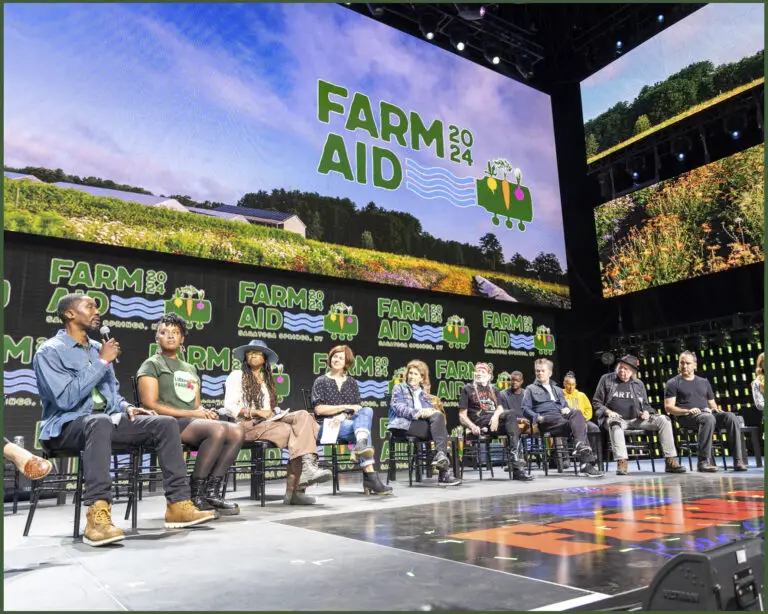
Before each Farm Aid begins, organizers travel across the region for that year’s festival, meeting farmers and hearing their stories of how they found their way to farming, ideas for the future of agriculture, and how this noble profession fosters community while feeding the country.
Then, on the day of Farm Aid, before the music starts, artists, farmers, advocates and board members gather on stage for a talk about the challenges and opportunities family farmers face. This casual press conference is still taken quite seriously by all, as the purpose behind Farm Aid is revealed with a fresh range of emotion, as the key players from that year’s region wear their heart on their sleeve as they share insight that is overlooked by the masses.
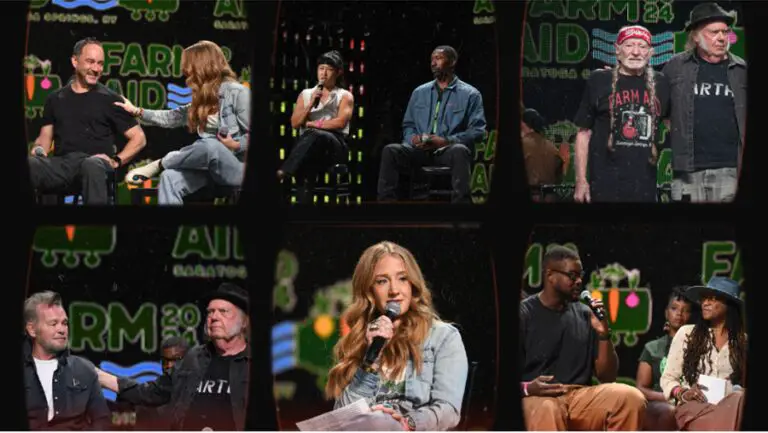
Last year at Saratoga Performing Arts Center, New York farmers, and the full Farm Aid board and staff members were a part of the opening press event,
With an early emphasis on minority, black and indigenous farmers, the struggles they face despite their desire to preserve a tradition for future generations brought the human side of farming to the forefront – there is a connection to a culture that fades without a concerted effort.
Local food was emphasized as you’d expect, but the local growers are the main course, including Justin Butts from Black Wind Farm in Berne, NY, Madeline and Bruce Poole from MK Dairy in Owego, NY, and Samantha Kemnah of Clover Bliss Dairy Farm Chenango County.
Before each Farm Aid begins, organizers travel across the region for that year’s festival, meeting farmers and hearing their stories of how they found their way to farming, ideas for the future of agriculture, and how this noble profession fosters community while feeding the country.
At the start of each Farm Aid, before the music starts, artists, farmers, advocates and board members gather on stage for a talk about the challenges and opportunities family farmers face. This casual press conference is still taken quite seriously by all, as the purpose behind Farm Aid is revealed with a fresh range of emotion, as the key players from that year’s region wear their heart on their sleeve as they share insight that is routinely overlooked by the masses.
Last year at Saratoga Performing Arts Center, New York farmers, Farm Aid board members Willie Nelson, Neil Young, John Mellencamp, Dave Matthews and Margo Price and Farm Aid staff members were a part of the opening press event,
With an early emphasis on minority, black and indigenous farmers, the struggles they face despite their desire to preserve a tradition for future generations brought the human side of farming to the forefront – there is a connection to a culture that fades without a concerted effort.
Local food was emphasized as you’d expect, but the local growers are the main course, including Justin Butts from Black Wind Farm in Berne, NY, Madeline and Bruce Poole from MK Dairy in Owego, NY, and Samantha Kemnah of Clover Bliss Dairy Farm Chenango County.
NYSFood
In between between each musical performance were videos found extolling the virtues of farming at a local level in a way that offers a connection between consumer and grower.
With a food landscape largely controlled by corporations, Farm Aid 2024 highlighted farmers creating community-based food systems, improving food access and quality, while boosting farmer income and local economies, and promote healthier soil and water. These farmers need more support from this country’s eaters, plus from representatives in local, state and federal government.
“Farmers are doing right by their communities, just as they always have, but if we’re going to get the food system we need, we all have to work together to support their efforts.”
Farm Aid President and Founder Willie Nelson
The “Good Food NY Bill” was passed in June 2024 by the state legislature, but was sadly vetoed by Gov. Hochul later that year. This bill would have allowed to schools to source 30% of ingredients to school lunches locally. While the bill was met with a veto, the cause behind the bill continues.
Still, programs like New York Thursdays, which bring foods grown and raised in New York State to New York public school cafeterias every Thursday, to help students learn how much of what they eat comes from local farms and dairies.
HOMEGROWN
While also the name of a long lost 2020 studio album from Neil Young, At Farm Aid, the HOMEGROWN Village engages festivalgoers with extensive hands-on activities that put a focus on the climate, soil, water, energy, food and farming. Attendees can learn to identify wild plants that are good for the local habitat, learn about cover crops, visit heritage breed livestock and poultry, and much more. Attendees are also able to hear from artists and farmers on the FarmYard Stage about pressing issues like food access, soil health and climate change.
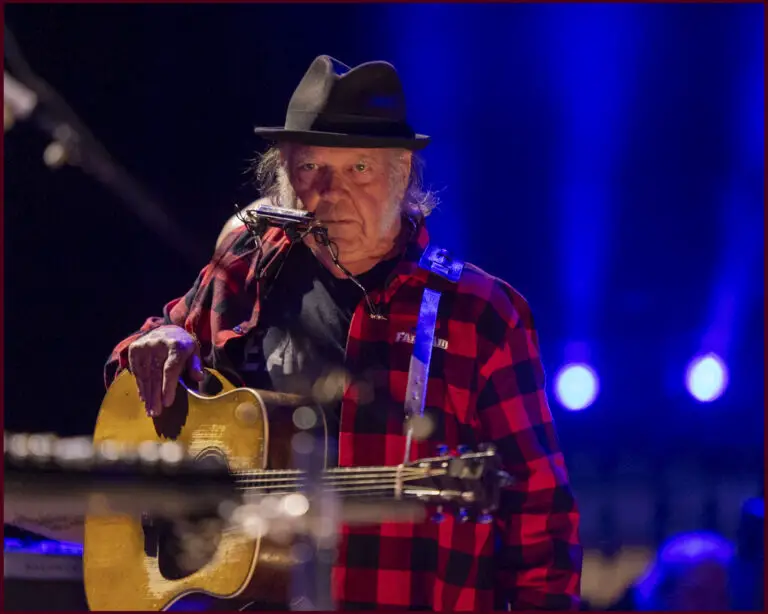
Additionally, Farm Aid’s HOMEGROWN Concessions serves food throughout the venue with ingredients produced by family farmers who utilize ecological production practices and receive a fair price for their product. The menu at Huntington Bank Stadium in Minneapolis will feature locally sourced and organic ingredients, with diverse menu choices, all served on compostable serviceware, including pork banh mi, wild rice bratwursts with cider sauerkraut, honey ice cream, cheese curds and more. Second Harvest Heartland and Loaves and Fishes will receive food left over from the event.
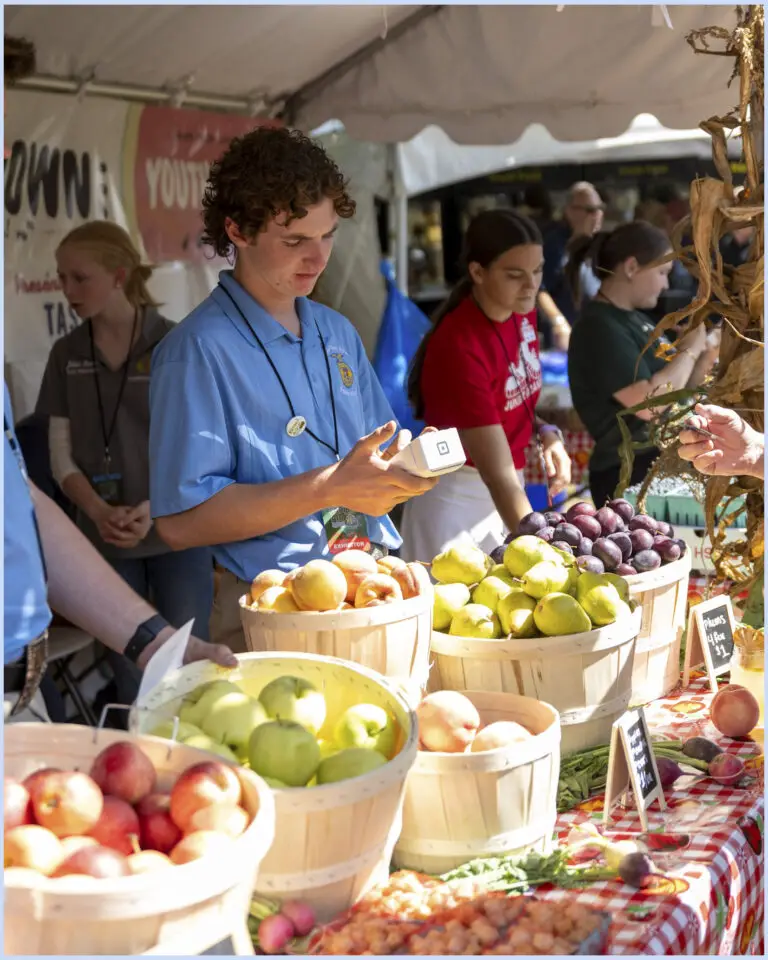
The 2024 edition of Farm Aid at SPAC included stuffed russet potatoes, curried chicken salad sandwiches, beef on weck, pork chop sandwiches, cold soba noodles, grilled street corn, burgers, hot dogs and sausages, plus fruit hand pies, cookies, ice cream sandwiches and fresh apples and plums for dessert.
A first-of-its-kind model for featuring family farm-identified, local and organic foods at major concert events, HOMEGROWN Concessions has fed more than 283,000 festivalgoers since its introduction in 2007 at Randall’s Island in New York City. HOMEGROWN serves as a model for entertainment events, including the Super Bowl and a variety of music festivals and venues, all of whom have embraced the Good Food Movement in concessions.
FDA, USDA and Farm Bills
To produce good, quality, biological food (the new term for organic, which has been co-opted and lost some of its true meaning) that we all need comes from the risks that farmers willingly take on, whether they be financial, mechanical or related to staffing. Despite these and other risks, farmers invest their time, labor, money and care because farming is their way of life and they know how critical their role is. However, the new regime in D.C. makes 2025 a sea change of a year. Cuts and funding freezes to crucial USDA programs, as well as the end of subsidies for soybeans undercut many farmers across the country. With uncertainty in the air, creating a business plan and securing funding through USDA contracts is up in the air as funding has been withheld. Add to the staffing cuts and office closures in critical parts of the country, and farmers have an additional hill to climb to get the answers they need.
A recent Agriculture Bill removes liability for Monsanto Bayer, preventing farmers from suing in the event they get sick from RoundUp pesticide and chemicals the company mandates use of to farmers who use their seeds. This protection of a private company’s actions, slipped into a bill, is an example of a private business gaining government protection, as opposed to the people being protected (via regulations) from the actions of a private company.
For months before Farm Aid begins, the team conducts listening sessions with rural residents, family farmers, farm advocates, labor leaders and community organizers, which culminate in a daylong forum the day before Farm Aid. This offers participants a chance to develop strategies to build community power, fight false narratives about farming and rural America, and build rural and urban coalitions to increase equity for farmers, workers and eaters.
More recently in 2025, the disorder sown from chaotic tariffs levied on various countries (which ultimately tax Americans), causes a new level of confusion, one that will hit home soon enough and not have a quick remedy. Algona, Iowa farmer Josh Manske said of the tariffs, “People not directly in the field, they feel when farmers are struggling, as do all our rural communities… agriculture reverberates throughout the entire economy.”
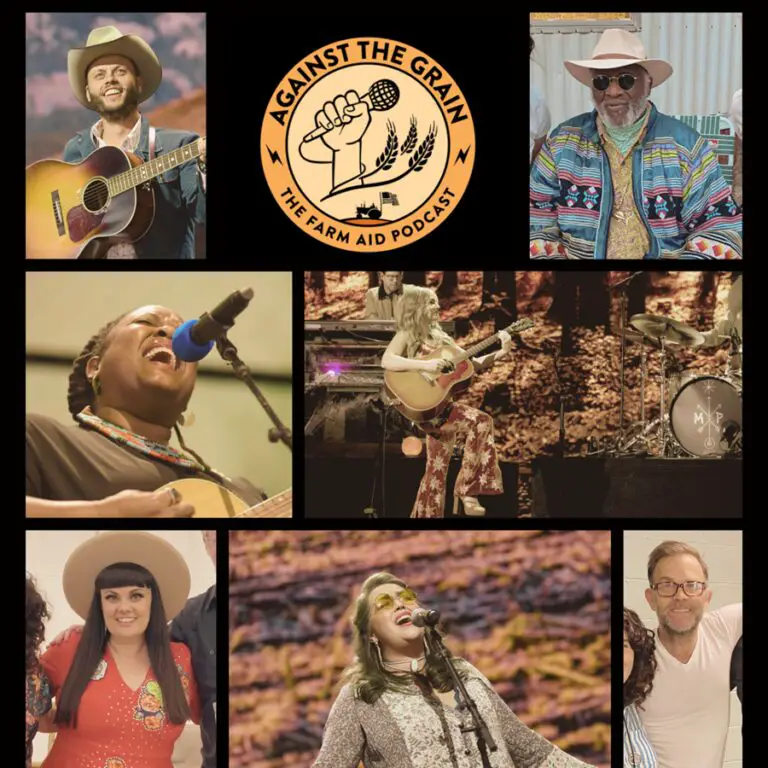
When the shelves are less stocked, the produce found in smaller quantities and meat prices rise, the trickle down effect from farmers will feel like a flood, with average Americans paying more while Big Ag plots to takeover more farms that cannot weather the storm, as mom and pop farms don’t have lobbyists at their disposal to get a federal subsidy to make ends meet.
All that said, John Mellencamp made it a point to remind the crowd gathered early in the day on September 21, 2024 to maintain their focus, saying “Don’t give a fuck about stuff that’s not fuckworthy.” Fight the good fight, ignore the noise and stay on target. Educate your neighbors, enlighten colleagues and eat local, biological (organic) food – the small things really do add up, and are a small effort in terms of activism, to show support for farms across the country.
You can learn more through Against the Grain, the FarmAid Podcast series, where artists and activism are highlighted, with appearances from Allison Russell, Grace Bowers, Emily Nenni and Dylan LeBlanc, as well as those from farming backgrounds who have joined Farm Aid over the years, taking a stand for family farmers, among them legendary bluesman, Taj Mahal, who grew up picking tobacco and working on a dairy farm in Massachusetts before studying animal husbandry and agronomy in college. Despite being musicians, the lives of many are intertwined with their love of the land and commitment to showing up for family farmers.
Stream live in HD at farmaid.org, starting at 11:30am CDT. Watch the festival on your TV, computer, phone or tablet at farmaid.org or on Farm Aid’s YouTube channel.
→ Continue reading at NYS Music
